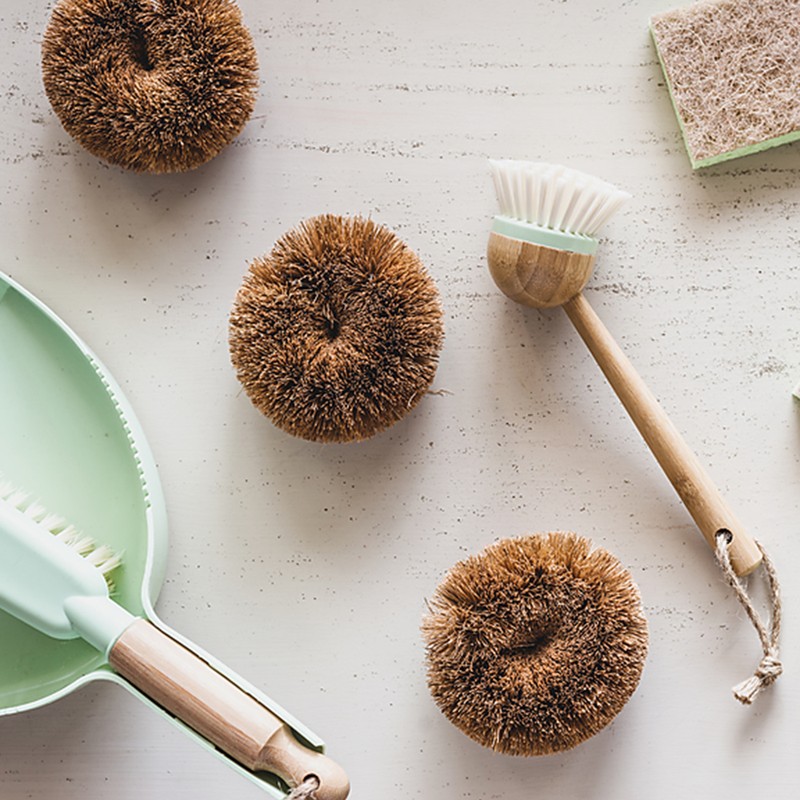When To Replace These 10 Household Essentials
DUSTERS
Dusters come in various forms. For feather varieties, these only need replacing if the feathers begin to fall out. Once you have finished using it, always shake it outside to remove any build-up of dust and dirt. Roughly the same rules apply to cloth dusters: wash them in the washing machine every few weeks to ensure they last. The same goes for more sophisticated microfibre cloths.
Replace: After signs of severe wear
Clean: Shake out weekly, wash monthly
KITCHEN CLOTHS
Much like sponges, cleaning cloths also collect dirt, grime and bacteria if they’re being used to clean down surfaces daily. If you can, pop yours in the washing machine regularly to keep it fresh and free from germs. Just don't forget to air dry it to prevent any odours building up when they’re stored.
Replace: Every two months
Clean: Weekly
WASHING UP SPONGES
Kitchen sponges can harbour any number of dangerous bacteria, so it's important to replace them regularly. While the experts recommend you should replace them once a week, that might not be in everyone’s cleaning budget. As an alternative, clean them by mixing ¾ of a cup of bleach with 3.5 litres of water and soak the sponge for five minutes. Make sure to rinse it thoroughly after.
Replace: Once a week
Clean: Rinse thoroughly with dish soap after every use
RUBBER GLOVES
Experts agree the gloves you wear – either for washing up or cleaning the bathroom – should last a fairly long time if you’re looking after them properly. To do so, wash them with warm water and dish soap after every use. You only need to replace them following clear signs of degradation, like splits or holes.
Replace: After clear signs of wear
Clean: After every use
TEA TOWELS
As one of the most germ-riddled products in your kitchen, hygiene experts say you should be aiming to switch out your tea towels every day for fresh ones, where possible. If that’s not realistic, make sure you wash them after every few days of use, and replace anything raggedy or stained which is no longer fit for purpose.
Replace: After clear signs of wear
Clean: Wash them two to three times a week
MOP HEADS
Mopping the floor is a great way to keep certain surfaces looking clean and free from walked-in dirt and grime, but mop heads tend to collect bacteria over time – especially if they’re not properly cared for. While you should rinse the head thoroughly after every use, it's also recommended you replace it entirely every two months.
Replace: Every two months
Clean: Rinse after every use
DUSTPAN & BRUSH
Seeing as most dustpan brush bristles are made from plastic, they tend to last a long time – possibly longer than any other cleaning product you own. However, as time passes, if you notice the bristles are beginning to thin down or fall out, this could signal the right time to replace your set.
Replace: Every few years
Clean: Shake out after every use
VACUUM BAGS
Contrary to popular belief, you should aim to change your vacuum bag before it gets full, which equates to at least once or twice, every six months for those who vacuum weekly. It will also depend on what you are vacuuming – for example, fine dust and pet hair will fill the bag much faster than ordinary dust and dirt. Either way, ensuring you have a new bag and regularly replacing the filter will no doubt prolong the life of your vacuum.
Replace: Every six months
Clean: Check the nozzle for build up after every use
CHEMICAL CLEANERS
You might not be aware of it, but store-bought cleaning supplies do expire, while holding onto them too long – as well as improper storage – can cause them to be less effective. Typically, you won’t have to change them too often, and expiration dates can be anywhere from six months to two years. Check the labels to see where you’re up to and move anything that needs using up quickly to the front of the cupboard or drawer.
Replace: As per the expiration date
Clean: Wipe containers after every use
HOMEMADE CLEANERS
Whipping up your own homemade cleaning products is a great way to save money and be kinder to the planet, but you’ll often find the solutions don't last as long as shop-bought bottles – mainly because they don't include long-term preservatives. Although rarely unsafe, expired products will be less effective over time. Where you can, try just to make enough for the task in hand, or for a few days’ worth, max.
Replace: Discard after each use
Clean: Wash out containers before refilling
DISCLAIMER: We endeavour to always credit the correct original source of every image we use. If you think a credit may be incorrect, please contact us at info@sheerluxe.com.


